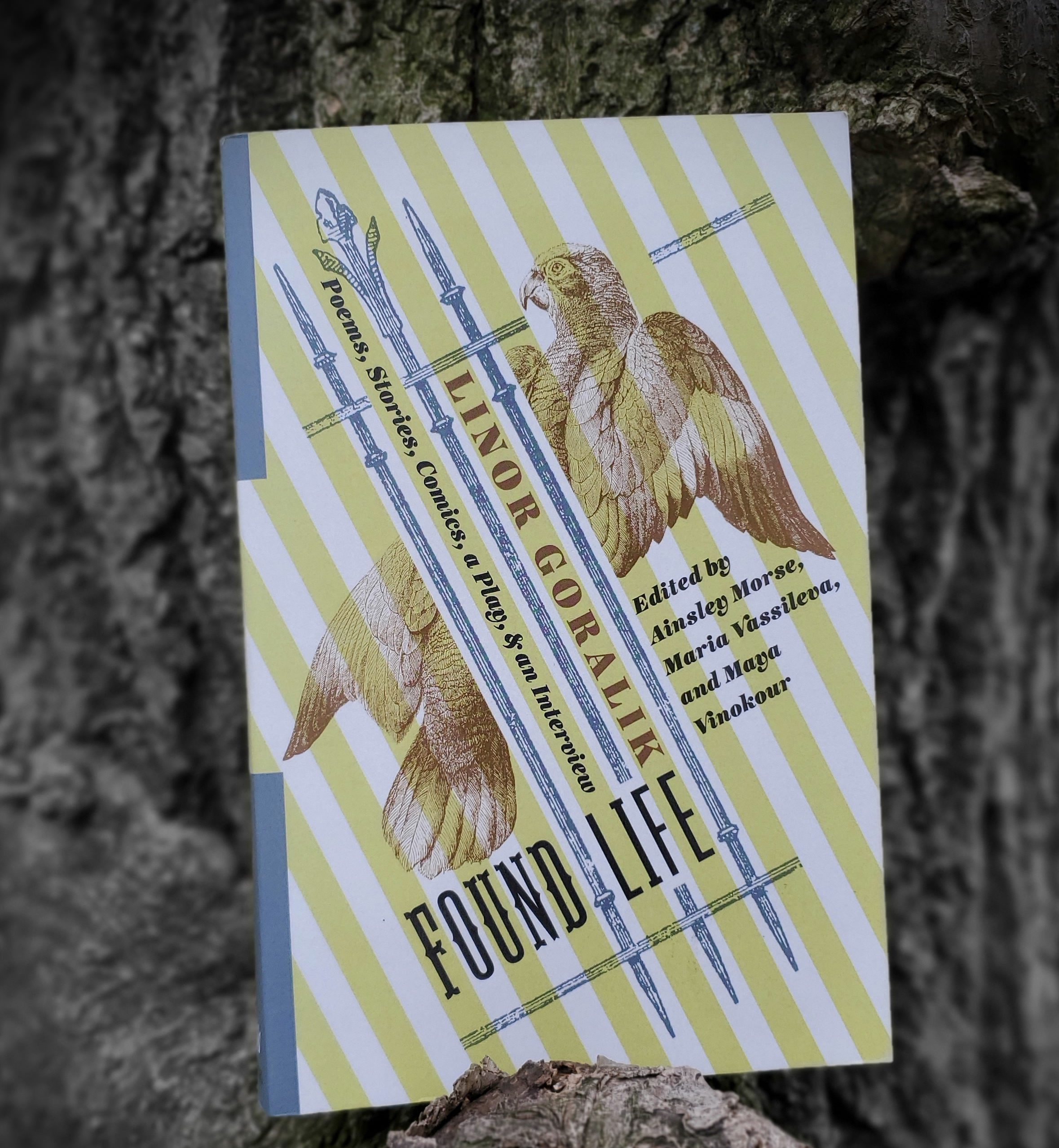Introducing Linor Goralik’s Found Life

On Tuesday 02/13, Columbia University Press author Linor Goralik will appear at NYU’s Jordan Center to discuss Found Life, a collected volume in translation co-edited by Ainsley Morse, Maria Vassileva, and Maya Vinokour; this event marks the beginning of a month-long book tour in the US for the author. We’ll will be running a series of blog posts in tandem with her book tour. After her stop at NYU’s Jordan Center, Goralik will give readings at the following events next week:
- Penn Book Center, with co-editor/translator Maya Vinokour, in Philadelphia, PA on February 15th at 6:30 pm
- PennState in State College, PA on February 16th at 3:30 pm
Linor Goralik is an award-winning contemporary Russian writer of flash fiction, poetry, essays, fairy tales, theater, and more. Her boundary-pushing works include fourteen books and dozens of other print and electronic publications.
One of the first Russian writers to make a name for herself on the Internet, Goralik writes conversational short works that conjure the absurd in all its forms, reflecting post-Soviet life and daily universals. In Found Life, the first substantial English translation of her work as a contemporary fiction writer, one finds a disparate corpus of literary forms–poems, stories, comics, a play, and an interview–as an ensemble of fragmented impressions that together conveys a vivacious and variegated picture of contemporary life in Russia and elsewhere.
Maya Vinokour, co-editor and co-translator of Found Life, characterizes the relationship between Goralik’s writing and the context from which it emerged: “Even as Goralik addresses topics specific to the contemporary Russian context, such as the effects of Western sanctions or the lingering traumas of Stalinism, she also pushes universal emotional buttons. Sudden sartorial upsets, a snub from a colleague, a misinterpreted remark: Goralik excels in wresting these small moments from a sea of higher-profile troubles” (the full piece from Music and Literature is available here).
Each of the following three excerpts from “The Blind Eye,” translated by Guilia Dossi and Ashley Morse, evokes the intimacy and idiosyncrasy of quotidian life in its mundane details, and at the same time also harbors nascent meditations on the nature of political ideologies and policies that inevitably spill over into one’s seemingly private existence.
They started making ice cream in cones flattened on both sides.
“It’s called a ‘flat cone.’
All you can think about is a tiny memorial plaque on the freezer:
‘Cone, squashed. 1921-2015. Posthumously rehabilitated.’
“I have a printout hanging over my bed: ‘In return for those tears that were shed on this Earth, it pleased our Lord to raise the price of oil to 95 dollars a barrel. O. Tabakov, 2007.’ I told Gavrilov about it and Gavrilov went all wide-eyed and said that now everything makes sense. Basically, he says, they’ve run out of tears—and so, since 2007, the Russian Federal government has focused all its efforts on getting citizens to cry enough for 15-20 more bucks a barrel. Or at least 13-14.”
“At a table in a Moscow café, a somewhat tipsy, not-so-young man in a white shirt and red tie bellowed: ‘Everything’s gonna be fine! Russia has always wallowed in shit and flourished!’”
The charm of Goralik’s work lies in the ease with which one travels between the minutiae of individual life and the larger contemporary reality that serves as its backdrop. As Stephanie Sandler, Professor of Slavic Languages and Literatures at Harvard University, puts it in her introduction to Found Life, Goralik tells a “small story about no one in particular, that opens out, like all good stories do, to the largest possible cultural truths.”
Besides the subtle relation between the personal and its grand background that is our epoch, in Found Life Goralik explores with consummate literary sensibility the following thematics: modernity and the nature of fleeting urban interactions; the female condition and gender dynamics; interiority of human emotions; the nature of language, its purpose, and the cultural practice of translation. In this series of blog posts over the next four weeks I will be zooming in on each of these themes to introduce more excerpts from the book.
All excerpts from Found Life: Poems, Stories, Comics, a Play, & an Interview by Linor Goralik. Edited by Ainsley Morse, Maria Vassileva, and Maya Vinokour. Translation © 2018 Ainsley Morse, Maria Vassileva, and Maya Vinokour. All rights reserved.
Linor Goralik’s tour for Found Life was made possible by Read Russia, underwriter of the Russian Library series, and co-sponsored by the Joseph Brodsky Fellowship Fund, of which Goralik was a poetry fellow in 2016.



